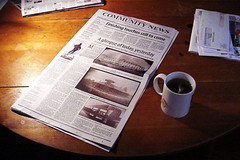|
|
News Digest: March 20th-April 6th 20106. April 2010 – 18:11 by John Heaven (TuTech Innovation GmbH) |
Gordon Brown, UK Prime Minister, asked the Queen to dissolve Parliament today; so there will be a general election on May 6th. Hence, this is an election special edition of the PEP-NET News Digest. I’ll separate it into two parts: articles relating to the UK election and others.
UK Election
You can read about the UK election on the BBC News website.
“Blogging The 2010 Election”, by Clare White: Clare White blogged for Talk About Local, which specialises in helping people to blog about their local communities, about some tools that bloggers can use to cover the election and a few tips about how to do it: she writes that bloggers can take advantage of the election campaign to profile themselves, should endeavour to provide even-handed coverage, and may want to consider blocking anonymous blog comments.
“General election 2010: Facebook and Twitter to have unprecedented impact”, Daily Telegraph: The Daily Telegraph makes the bold claim “Facebook and Twitter to have unprecedented impact” on the election. It says that whereas Alistair Campbell slickly used traditional media to bring Labour to power in 1997, we are seeing the rise of campaigning through social networks. (Although some people doubt that campaigns are effective in determining election results at all.)
“Tweetminster Predicts points to hung parliament”, Tweetminster: Tweetminster is conducting an experiment to see whether they can predict the results of the UK general election using Twitter. At the moment, they are predicting a hung parliament — of course it remains to be seen whether their prediction is borne out in the real result.
Other
“Fix My Street passt nicht zur deutschen Verwaltungsrealität” (“Fix My Street isn’t suited to the reality of German public administration”): In an interview with Government 2.0 Netzwerk Deutschland, Helmut Semmet, who managed a similar project in Brandenburg called Maerker, says that Fix My Street isn’t suited to German public administrations because of the number of stake-holders and responsible parties involved. Here’s a rough translation of one paragraph:
“If, for example, a citizen wants to report a pothole, they don’t care which public body [Kommune, Landkreis or Landesbetrieb Straßenwesen] is responsible for it. And depending on the individual case, there are several more actors that could be affected: for example the police or a multitude of partnerships. Because of this, we have spoken to and co-operated with many partners. For the citizen, we want it to be a easy and transparent as possible.”
Local by Social: The best and brightest from Britain’s social media scene have collaborated to tell local government how to “do” social media. You can see for yourself by reading the full “Local by Social” guide, published by IDeA, the UK Improvement and Development Agency.
“Using Social Media: A Guide For Councillors”, also by IDeA (see above) is a social media guide for the UK’s local elected representatives.
“Links, zwo, drei, vier”, Politik Digital: In their regular German-language round-up of eParticipation, PEP-NET member Politik Digital reference an article on Welt.de (the website of a national newspaper) suggesting that the influence of German political bloggers is increasing.
“Evaluation Report on First Austrian E-Voting Use”, e-voting.cc: PEP-NET member e-voting.cc provide an English-language summary of the report into the first use of e-voting for a legally-binding election in Germany. 1% of eligible voters cast their votes electronically in the Austrian Federation of Students election.
“Bristol City Council e-Participatory Budgeting Pilot Goes Live”, Delib: Another PEP-NET member, Delib has delivered a participatory budgeting pilot for Bristol City Council. £15,000 was set aside for residents to allocate according to their wishes, using online tools.
Greenpeace campaign against Nestlé: Following Greenpeace’s revelation that Nestlé use palm oil from endangered rainforests to produce KitKats, a video “went viral” and Nestlé’s Facebook page was bombarded with negative comments. Here is the Greenpeace page; here is Nestlé’s Facebook page.
Don’t forget: the second PEP-NET Online Discourse is coming up! Starting on 12th April, eParticipation practitioners, experts and just about anyone who is interested will be discussing eParticipation in Central and Eastern Europe. See the full blog post here.
Tags: inenglish











One Response to “News Digest: March 20th-April 6th 2010”
By Natasha on Apr 16, 2010
Thanks for the helpful list John! I’ve just written a blog on how Social Media is being used by the three main parties, which you may also be interested in: https://www.siliconbeachtraining.co.uk/blog/social-media-predict-general-election/
Natasha